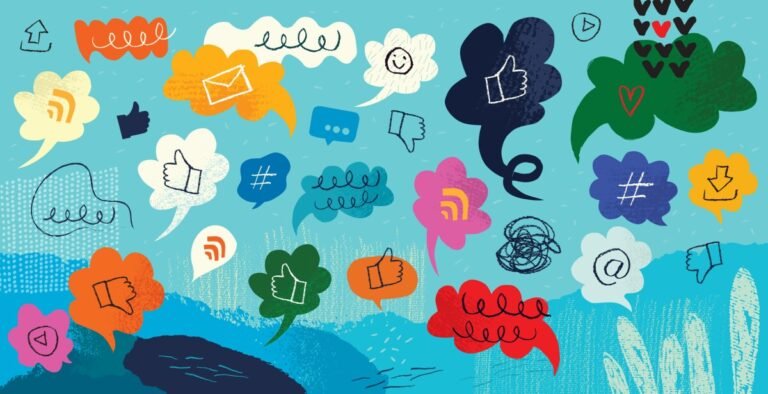We often hear about how negatively social media can affect teenagers’ mental health. A growing number of laws and lawsuits point to social media companies playing a major role in causing the mental health crisis among young people.
Among the many common criticisms are: Social media invites unhealthy comparisons with peers, making users feel inadequate and dissatisfied with their lives. The platform is addictive, and teens are sacrificing their relationships, schoolwork, and sleep to use it. Social media bombards impressionable people with false and disturbing information. And finally, critics argue, it provides bullies with new ways to terrorize their victims.
But these issues are only one side of the coin, says Chelsea Olson, a research associate in the University of Wisconsin Department of Pediatrics and a member of the university’s social media and adolescent health research team.
Like most activities that teens engage in, “social media has both benefits and risks,” Olson said.
To learn more about how social media can benefit the health of teens, especially certain groups of children, Education Week spoke with Olson by phone. This conversation has been edited for length and clarity.
What do you think is the biggest benefit for teens using social media?

Two things I often mention are social connections and social support. [Social media] This allows youth to connect with people near and far, form and maintain friendships, and stay in touch with family members who live far away. And you can also join larger networks based on your interests, such as fandoms.
And social media provides a space for social support. Seeking and receiving social support on social media has been shown to reduce symptoms of depression and help teens feel better about themselves. There is a support group on Facebook. Anonymous groups often exist, such as through Reddit.
And the other thing is that social media offers so many learning and information-seeking opportunities. Teens can ask for information about their relationships. [with] friends and family. They can ask for health information, information about their identity, and information about their school. It’s a really great place to seek information.
Other benefits [researchers] Let’s talk about:
- creative expression. Teens can express themselves creatively by posting and sharing photos, art, music, and more.
- Citizen participation. This allows teens to participate in public service, practice public service online, and participate in advocacy, activism, fundraising, and encouragement and involvement in the political process.
- after that, Identity development. Allow teens to engage in identity tasks they already have experience with. This is because during adolescence, children develop a coherent sense of identity that is separate from others and their parents. They can use social media to tackle these tasks, allowing them to showcase and explore parts of themselves and get feedback from others. I don’t know if safe is the word I’m looking for, but it’s like a safer place to express yourself and get feedback.
In some situations, it can be a safer space. Talk about LGBTQ youth. Because I think this is probably a very good example.
Therefore, clearly LGBTQI+ youth face many challenges such as prejudice and discrimination. They are at higher risk of being bullied. They may also encounter safety hazards and harsh environments at home or school. And with all of this, they report higher levels of mental health distress. Therefore, social media is a way in which they can find community, connect with others, learn about themselves, and find resources online. Social media can actually become something of a lifeline, especially for young people who have experienced negativity firsthand.
They may also be young people with chronic illnesses, especially rare or complex illnesses. Go find others going through similar experiences, use social media for peer connections and peer support, join support groups, and find information about your illness that you may not find elsewhere. You may be able to access.
Another is that young people who have social anxiety about interacting in person can use social media and the internet to practice those skills.
The counterargument to this is as follows. “You need to get through it offline and develop skills in the real world.” How would you respond if someone said that?
Research shows that adolescents who are not socially anxious and have truly rich social communities offline tend to take those communities online and strengthen their offline communities. It’s like the rich getting richer, already having success offline, only to enhance that interaction by bringing it online.
Research has shown that children with social anxiety – children who struggle offline – may be able to move online to practice those skills and, hopefully, offline as well.
What do educators need to do to help children enjoy the benefits of social media while avoiding the risks?
modeling [positive social media use] is really important.
A really great resource is Common Sense Media. They offer free-to-use, research-backed curriculum specifically for educators.
Another resource is the American Academy of Pediatrics’ Family Media Plan.. Families can plan and set boundaries with their teens. Involving young people and their thoughts, perspectives and ideas is very important. Because when you involve youth, they’re more likely to follow your boundaries and goals.
Because social media is here to stay, I think it will be very important to add media literacy and digital citizenship skills to school curricula. Teaching them early on and making sure teens have those tools and skills is essential to helping them actively use technology in the future.


